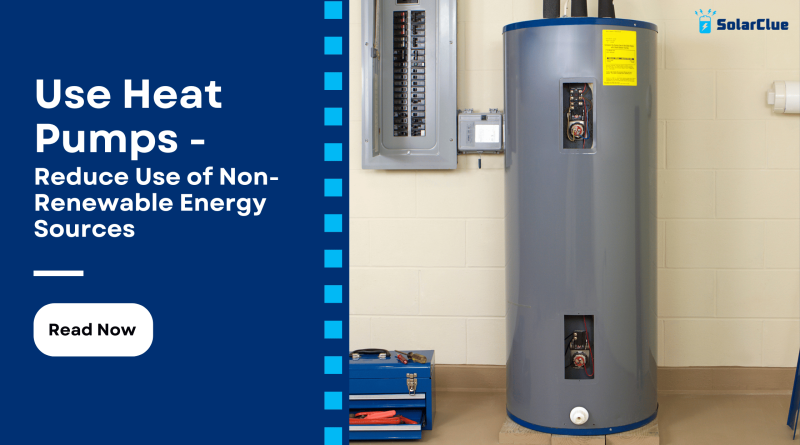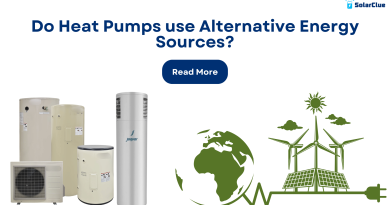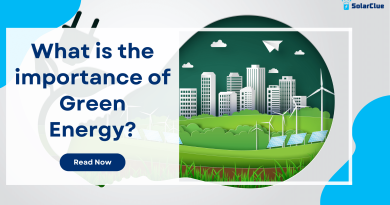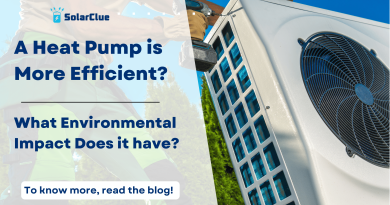Use Heat Pumps-Reduce Use of Non-Renewable Energy Sources
With rising energy costs and environmental concerns, it’s crucial to explore sustainable alternatives that reduce our dependency on non-renewable energy sources. One such solution is the heat pump, which not only saves money but also contributes to a greener future.
In this blog post, we’ll dive into the world of heat pumps and understand how they can significantly reduce the usage of non-renewable energy sources. Let’s get started!
Table of Contents
What is a Renewable Source of Energy?
Renewable source of energy is that energy source that can be replenished naturally and sustainably. This is the way to differentiate between renewable and non-renewable sources of energy. Non-renewable sources like fossil fuels, which are finite and contribute to environmental degradation. Examples of renewable energy sources include solar, wind, hydro, geothermal, and biomass. These sources are clean, abundant, and have a much lower impact on the environment compared to non-renewable sources.
One of the key advantages of renewable energy sources is their ability to reduce greenhouse gas emissions and combat climate change. Additionally, they are virtually inexhaustible, making them a viable long-term solution for our energy needs.
What is a Heat Pump?
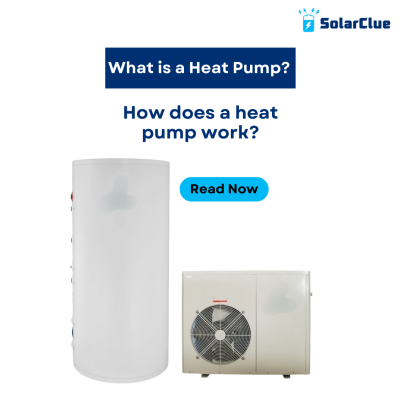
A heat pump is a water heating device, to meet your daily hot water needs. It is energy-efficient, as it uses less electricity than other traditional water heaters. The difference lies in the working principle. Any traditional water heater, like a geyser, uses direct electricity to heat water. Whereas, a heat pump uses electricity to only transfer heat from one place to another. This heat is used to produce hot water, rather than electricity. A heat pump is one of the best sustainable ideas for the future.
How Does a Heat Pump System Work?
A heat pump works on the principle of transferring heat from one place to another.
This system consists of two main components: an indoor unit and an outdoor unit.
The outdoor unit has two parts – an exhaust fan and a compressor. And the indoor unit is the storage tank, where water is stored.
The exhaust fan absorbs heat from the surrounding air, while the compressor compresses the refrigerant gas, increasing its temperature. This heated refrigerant gas then passes through a spiral condenser inside the indoor unit, transferring its heat to the water stored in the tank. This process continues until the desired water temperature is reached.
Unlike traditional geysers that use a significant amount of electricity to generate heat, heat pumps consume less energy by simply moving heat from one place to another. This makes them more energy-efficient and cost-effective in the long run.
Do Heat Pumps Reduce the Usage of Non-Renewable Energy Sources?
Yes, heat pumps significantly reduce the usage of non-renewable energy sources. By utilizing the heat from the surrounding air, which is a renewable source of energy, heat pump water heaters rely less on electricity generated from non-renewable sources like coal or natural gas.
Electricity in heat pumps are used only to transfer heat and compress it. This process requires significantly less electricity than a water heater like a geyser which uses direct electricity to heat water. Heat pumps are said to be approximately 90% renewable, significantly reducing the usage of non-renewable energy sources like fossil fuels. This not only results in reducing many environmental hazards, but also contributes in saving costs over time.
What are the Benefits of Heat Pumps?

Heat pumps are definitely the best choice for water heater in every Indian household. And it is not just because of its energy-efficiency. There are several benefits that heat pumps offer. They are:
1. Cost-Effective
Heat pumps have high upfront cost. However, they make up for it through lower operating costs. Heat pumps transfer heat rather than generating it directly. This uses far less electricity – up to 75% less. Over its 10-15 year lifespan, a heat pump can save you hundreds or even thousands in energy costs. So it is actually a cheaper alternative to other traditional water heaters like geysers.
2. Long Lifespan
With proper maintenance, heat pumps last 15 years or more – significantly longer than standard electric geysers (8-10 years). So there is no need for replacement for a long time. This extended life cycle also contributes to it being a cost-effective option.
3. Reduced Water Wastage
Traditional water heaters constantly heat and reheat the same water, leading to significant energy losses. Heat pumps heat water more efficiently, so you don’t have to run the tap as long waiting for hot water. This conserves water, especially in households with long pipe runs.
4. Efficient in Cold Climates
One common misconception about heat pump water heaters is that they may not perform well in colder climates. However, modern heat pump water heaters are designed to be efficient even in low temperatures. They can effectively extract heat from the surrounding air, even when the temperature drops below freezing. This makes heat pump water heaters a viable and energy-efficient option for hot water needs in various climates, including colder regions.
5. Manual Temperature Setting
Most heat pumps allow you to change temperature as per your requirements. This ensures you have hot water when needed without wasting energy by overheating the water beyond your requirements.
6. Availability in Different Sizes
Heat Pumps normally have an indoor and an outdoor unit. But many homes in India, specially in big cities, may not have that space available. For that, a single-unit heat hump is designed. It is also called Integrated Heat Pump.
Conclusion
Heat pumps are the future of water heating solution in India. It not only is a sustainable solution, but also results in huge cost saving in the long-term. It is now time for India to embrace heat pump technology, to meet the daily hot water needs.
Visit SolarClue® to see the best heat pump water heaters. SolarClue® is an online marketplace where solar energy products are sold at discounts up to 50%.

